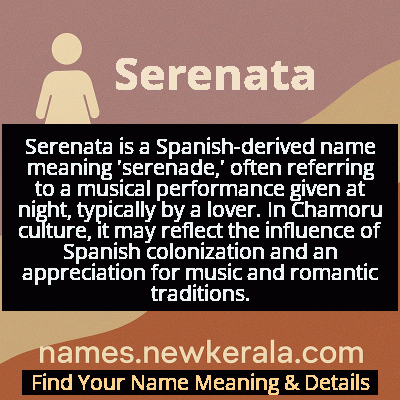Serenata Name Meaning & Details
Origin, Popularity, Numerology Analysis & Name Meaning of Serenata
Discover the origin, meaning, and cultural significance of the name SERENATA. Delve into its historical roots and explore the lasting impact it has had on communities and traditions.
Name
Serenata
Gender
Female
Origin
Chamoru
Lucky Number
2
Meaning of the Name - Serenata
Serenata is a Spanish-derived name meaning 'serenade,' often referring to a musical performance given at night, typically by a lover. In Chamoru culture, it may reflect the influence of Spanish colonization and an appreciation for music and romantic traditions.
Serenata - Complete Numerology Analysis
Your Numerology Number
Based on Pythagorean Numerology System
Ruling Planet
Moon
Positive Nature
Diplomatic, friendly, artistic, empathetic.
Negative Traits
Over-sensitive, moody, indecisive, prone to self-pity.
Lucky Colours
Green, cream, white.
Lucky Days
Monday.
Lucky Stones
Pearl, moonstone.
Harmony Numbers
1, 3, 4.
Best Suited Professions
Diplomats, mediators, caregivers, artists.
What People Like About You
Cooperative spirit, friendliness, artistic talent.
Famous People Named Serenata
Serenata Cruz
Cultural Preservationist
Founded the Guam Cultural Music Initiative preserving traditional Chamoru serenading traditions
Serenata Flores
Musician
Award-winning guitarist known for blending traditional Chamoru music with contemporary styles
Serenata Baza
Educator
Developed the first comprehensive Chamoru language music curriculum for Guam schools
Serenata Chargualaf
Community Leader
Organized the annual 'Nights of Serenata' festival celebrating Pacific Islander musical heritage
Name Variations & International Equivalents
Click on blue names to explore their detailed meanings. Gray names with will be available soon.
Cultural & Historical Significance
The name embodies the preservation of cultural identity through music, serving as a living testament to the resilience of Chamoru traditions despite centuries of colonial influence. During the Spanish era, serenatas became a way for Chamoru people to maintain their cultural practices while adapting to new influences. The tradition continued through American administration and remains vibrant today, particularly in village fiestas and family celebrations. The name Serenata thus represents both historical continuity and cultural pride, connecting modern Chamoru people to their ancestral practices of musical expression and community gathering. It symbolizes the enduring spirit of the Chamoru people and their ability to transform external influences into unique cultural expressions that strengthen rather than diminish their identity.
Extended Personality Analysis
Individuals named Serenata are often characterized by their artistic sensitivity, emotional depth, and strong connection to community traditions. They typically possess a natural musicality and appreciation for beauty in all forms, from visual arts to poetic expression. Serenatas tend to be romantic souls who value meaningful connections and often serve as emotional anchors within their social circles. Their personality reflects the gentle, evocative nature of evening music - they're often calm, reflective individuals who bring harmony to chaotic situations.
Many Serenatas demonstrate exceptional empathy and intuition, making them excellent listeners and counselors. They frequently exhibit creative problem-solving skills and approach challenges with the same improvisational spirit that characterizes musical serenades. While generally peaceful, they can be fiercely protective of their cultural heritage and loved ones, showing strength when traditional values or family bonds are threatened. The name suggests someone who moves through life with grace and purpose, much like a well-composed musical piece - with moments of quiet reflection building toward meaningful crescendos of action and expression. Their presence often has a calming, uplifting effect on others, reminiscent of the soothing quality of evening music that the name evokes.
Modern Usage & Popularity
In contemporary times, Serenata remains a distinctive and meaningful choice, particularly within Chamoru and Hispanic communities. While not among the most common names, it has seen a gradual increase in usage as parents seek unique names with cultural significance and beautiful meanings. The name is especially popular in Guam, the Northern Mariana Islands, and among the Chamoru diaspora in the United States mainland, particularly in California and Hawaii. Modern usage reflects a growing interest in preserving indigenous Pacific Islander identities and cultural heritage, with many parents choosing the name specifically to honor their Chamoru ancestry. Social media and global connectivity have also contributed to its wider recognition, with parents drawn to its melodic quality and romantic connotations. The name maintains its traditional feminine association while appealing to contemporary sensibilities that value cultural authenticity and meaningful nomenclature. Its usage patterns show it's most commonly given to girls born into families with strong connections to musical traditions or cultural preservation efforts.
Symbolic & Spiritual Meanings
Symbolically, Serenata represents the power of music to bridge cultural divides, heal emotional wounds, and preserve collective memory. The name embodies the metaphorical 'music of the soul' - that inner harmony that connects individuals to their heritage and community. It symbolizes romantic devotion, cultural continuity, and the transformative power of artistic expression. Like the evening serenades it references, the name suggests moments of transition and reflection, representing the beauty found in twilight hours and the promise of new beginnings. In Chamoru culture specifically, Serenata symbolizes the resilience of indigenous traditions and the creative adaptation that has allowed Chamoru identity to flourish despite historical challenges. The name serves as a living connection to ancestral practices while embracing contemporary expressions of cultural pride. It represents how beauty and tradition can be preserved through naming practices, creating a symbolic bridge between past and future generations.

